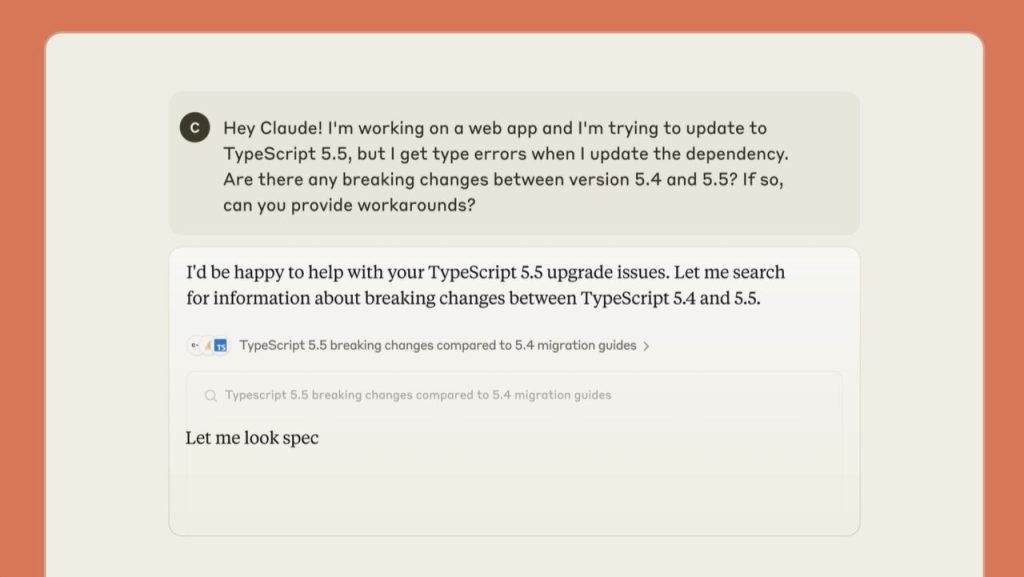Anthropic has enhanced its AI assistant Claude rolling out new features designed to weave the AI more deeply into users’ daily workflows. The update introduces “Integrations,” allowing Claude to connect with external applications, and “Advanced Research,” a mode enabling more comprehensive information synthesis from multiple sources.
Anthropic says that these capabilities aim to provide Claude with richer context, transforming it into a more effective collaborator. Concurrently, the company made its standard web search feature globally available to all paid subscribers.
MCP: The Standard Enabling Connectivity
The technical foundation for these new connections is the Model Context Protocol (MCP), an open standard Anthropic initiated in November 2024. MCP establishes a common method for AI models and agents to interact with external tools and data repositories using a client-server model over HTTP or local connections.
Anthropic originally highlighted the need for such a standard, noting that previously, “Every new data source requires its own custom implementation, making truly connected systems difficult to scale.” The protocol’s relevance has grown with broad industry support; OpenAI confirmed its adoption on April 22, joining Microsoft, AWS, and Google. The MCP specification and associated SDKs are open-source, facilitating wider implementation.
Plugging Claude into Your Workflow
The “Integrations” feature leverages MCP, allowing users to link Claude with various external applications via compatible servers. Initial launch partners include Atlassian (Jira, Confluence), Zapier, Cloudflare, Intercom, Asana, Square, Sentry, PayPal, Linear, and Plaid. Anthropic also mentioned that integrations from Stripe and GitLab are forthcoming.
These connections enable Claude to access data and trigger actions within these services. For example, the Zapier integration connects Claude to thousands of apps, potentially allowing it to perform actions like “automatically pulling sales data from HubSpot and preparing meeting briefs based on your calendar.” Similarly, the Atlassian integration facilitates collaboration by helping “summarizing and creating multiple Confluence pages and Jira work items at once.”
Anthropic emphasizes that developers can create custom integrations, potentially in as little as 30 minutes using platforms like Cloudflare. Users manage these connections via their Claude.ai profile settings or directly within the chat interface.
However, Anthropic cautions users to connect only trusted servers and carefully review permissions, particularly when using custom integrations with the Research feature. For business users on Team and Enterprise plans, integrations are currently limited to private Projects.
Research Capabilities Deepen
Alongside Integrations, Anthropic introduced “Advanced Research,” a significant upgrade to the research tool first launched around April 16. The initial version connected Claude to Google Workspace (Gmail, Docs, Calendar) and performed web searches. Advanced Research expands this by enabling Claude to query the web, Google Workspace, *and* data from connected Integrations. Anthropic describes this as an agentic capability where Claude “breaks down your request into smaller parts, investigating each deeply before compiling a comprehensive report.”
This deeper investigation process can take between five and 45 minutes, a notable increase from typical chatbot response times, reflecting a trade-off between speed and the depth of analysis. The generated reports include citations linking back to the original sources, whether they are web pages, internal documents, or data from integrated apps. This feature incorporates the standard web search functionality previewed in the US from March 20, which is now globally available to all paid subscribers.
Availability, Pricing, and Future Implications
Integrations and Advanced Research are available now in beta for users on Claude Max, Team, and Enterprise plans, with Pro plan access expected soon. Individual access to these advanced features requires the Claude Max plan, offered at $100/month (~5x Pro usage) or $200/month (~20x Pro usage), which also provides priority access during peak times. Anthropic also increased usage limits for its Claude Code tool for Max subscribers.
These updates, powered by the Claude 3.7 Sonnet model, position Anthropic’s assistant more competitively against OpenAI’s ChatGPT and Google’s Gemini. The move towards more agentic AI, capable of interacting with external systems, aligns with broader industry trends.
It also echoes earlier remarks from Anthropic’s CISO, Jason Clinton, who predicted the arrival of AI “virtual employees” and highlighted the associated security challenges. Clinton warned in April, “In that world, there are so many problems that we haven’t solved yet from a security perspective that we need to solve.”
While these new features expand Claude’s utility, they also underscore the growing need for robust security practices and clear accountability frameworks as AI agents become more autonomous and integrated into sensitive workflows.

